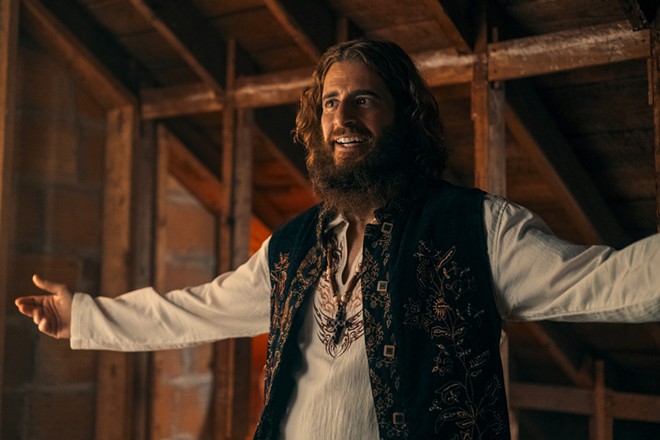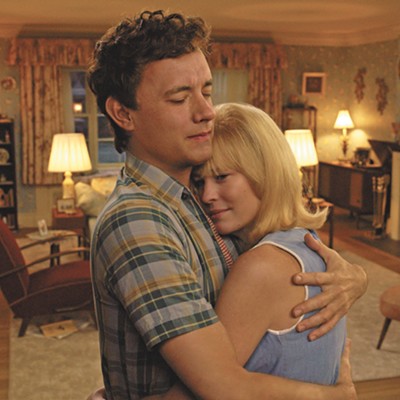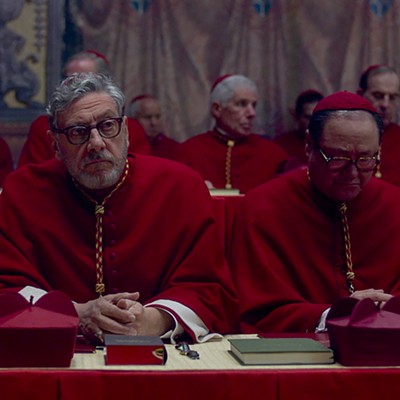For the past decade or so, brothers Jon and Andrew Erwin have steadily taken their faith-based filmmaking mainstream, with biopics about Christian athletes (Woodlawn, American Underdog) and musicians (I Can Only Imagine, I Still Believe) featuring recognizable actors and slick production values. They're still Christian movies, but they tone down the proselytizing and the politics in favor of a broader inspirational message that can more successfully appeal to a secular audience. The Erwins' latest film, Jesus Revolution, returns to more explicitly religious subject matter, while retaining that bland professionalism.
Like those other recent Erwin movies, Jesus Revolution is based on a true story, recounting the origin of the Calvary Chapel megachurch, which got its start during the so-called "Jesus freak" movement of the late 1960s and early 1970s. Calvary rises to prominence thanks to two seemingly opposite figures, veteran pastor Chuck Smith (Kelsey Grammer) and hippie preacher Lonnie Frisbee (Jonathan Roumie). Chuck begins the movie as a stuffy, out-of-touch reactionary, who scoffs at the hippies protesting the Vietnam War. But when his daughter (Ally Ioannides) brings home a hippie hitchhiker who looks like Jesus and extensively quotes scripture, he starts to change his point of view.
Thanks to Lonnie's outreach, Chuck's floundering Southern California church starts growing exponentially, filling its ranks with wide-eyed new converts who prefer tie-dye over neckties and often don't even wear shoes. Whatever tension might exist between hippie values and Christian dogma is mostly glossed over, aside from an anti-drug message positing that all those young people who dropped acid were really just searching for Jesus.
One such young person is Greg Laurie (Joel Courtney), a teenager who turns out to be the movie's real main character. As Chuck and Lonnie take Calvary to new heights, Greg and his girlfriend Cathe (Anna Grace Barlow) trade getting high for getting saved, and Greg starts to see a future for himself in the church. Since Jesus Revolution is based on Laurie's actual book of the same name, it's obvious that he'll move past any minor obstacles and become a beloved worship leader.
There's very little conflict in Jesus Revolution until the final act, when tensions arise between Chuck and Lonnie over Lonnie's increasingly self-aggrandizing sermons, and Greg and Cathe have a brief rift in their relationship. This is the kind of movie that features a character unironically calling Jesus a "radical dude," with a sanitized vision of the counterculture that's limited to a single unconvincing Janis Joplin concert. Co-directors Jon Erwin and Brent McCorkle give the movie a sun-dappled Southern California look, stuffing the soundtrack with as many familiar classic-rock hits as they can afford, but it still just comes off as awkward parishioners doing Summer of Love cosplay. Jesus Revolution might be the squarest movie ever made about hippies.
The central performances are passable (although Grammer is about 25 years older than Smith actually was during this period), but the dialogue is cheesy, the emotions are contrived, and the religious conversions are disingenuous. Even the New York City media elite (played by preacher and faith-based cinema mogul DeVon Franklin) reporting on the movement for Time Magazine is easily won over.
There's no mention, even in closing title cards, that Frisbee was a closeted gay man who died of AIDS, or that Smith later blamed God's wrath against homosexuals for 9/11. The church of Jesus Revolution is as phony as its take on radicalism, and that makes for hollow drama in addition to poor theology. The Erwins clearly aren't equipped to handle the complexities of this movement; they're better off sticking to inspirational sports movies. ♦


















